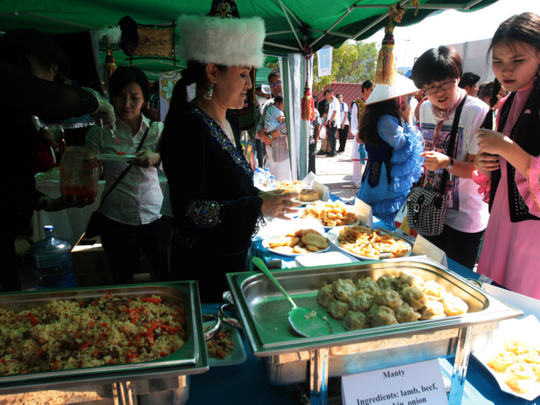
Abu Dhabi: Tehmina Mazood, a Pakistani homemaker and her two friends living in the capital, tasted Kazakh cuisine for the first time on Saturday.
“Kazakh desserts tasted unique,” Aziz said at the Asian Food and Craft Bazaar organised by the Association of Spouses of Asian Ambassadors in the UAE at the Indian Embassy premises.
Aziz’s friend, Rumana Rashid, said a Kazakh food tasting like ‘samosa’ [A triangular savoury pastry fried in ghee or oil, containing spiced vegetables or meat] was an example of common tastes of people living in different parts of the world.
Amila Habib said the chance to enjoy the food and cultures of other peoples was a unique opportunity for cultural interaction.
Deepa Seetharam, wife of the Indian Ambassador to the UAE, said the organisers were delighted to have Shaikha Alyazia Bint Saif Al Nahyan as the chief guest. Among the 27 Asian Embassies in the capital, 15 Asian nations set up food stalls at the bazaar and 10 nations participated in the cultural programmes, she said.
As an annual event, it was organised this year under the leadership of Zakia Imran, the wife of the Bangladeshi Ambassador to the UAE, who is the president of the association.
Gayithri Pushparajan, a Malaysian homemaker, who was displaying souvenirs from Malaysia, said many people asked about a batik-designed cloth from Malaysia. Many people wanted to know the difference between Indonesian and Malaysian batik designs although the difference is narrow. “People are so curious to know about other cultures,” she said.
Batik, an Indonesian traditional art of dyeing cloth using wax, was recognised by Unesco as an intangible cultural heritage in 2009. South African leader and peace icon Nelson Mandela’s love for colourful batik shirts also shot it to global prominence.
Manshid Bagheri, an Iranian homemaker in the capital, who was selling handmade Persian silk carpets, said the visitors were curious to know how the beautifully designed carpets were made. “With a price range of Dh6,000 to Dh24,000, not all can afford this. But all were surprised to hear that it takes two to two-and- half-years to make one carpet,” Bagheri said.











